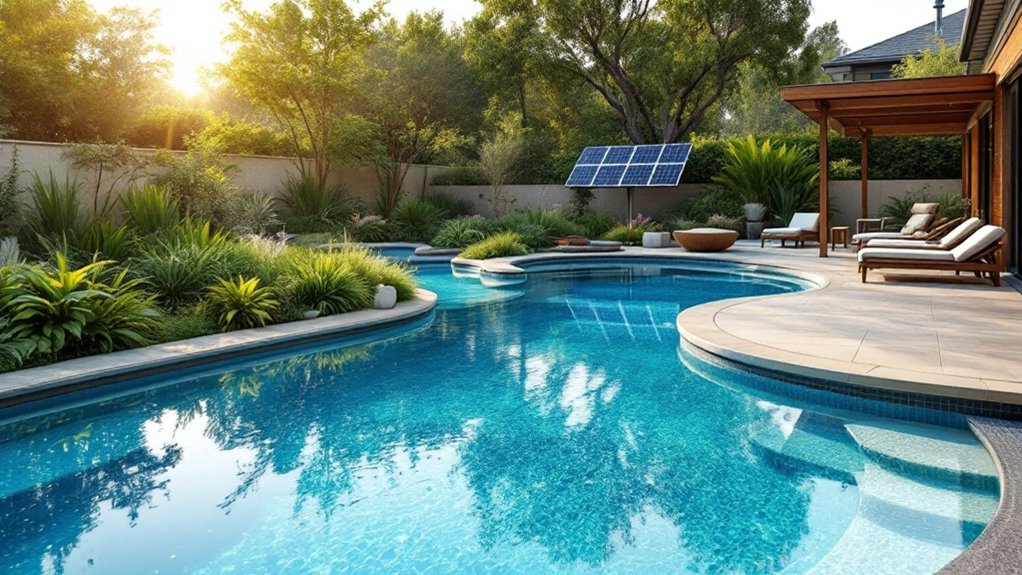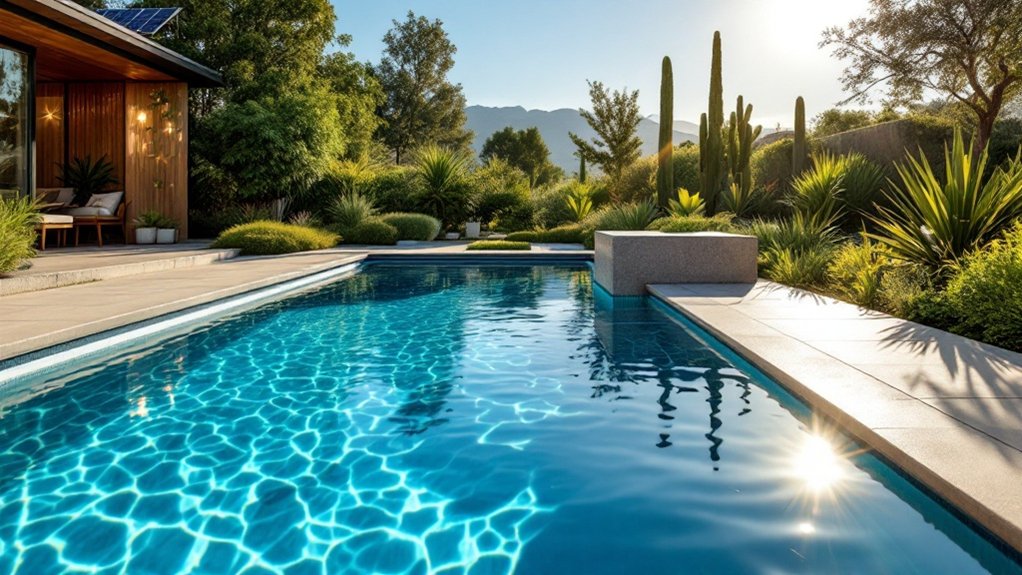The future of pool design is shifting towards environmental sustainability. Builders are increasingly focusing on eco-friendly materials and practices. This trend includes energy-efficient systems and innovative technologies that enhance water conservation. Landscape design also plays a vital role in creating a balanced ecosystem. As these changes take shape, the impact on both aesthetics and functionality raises important questions about the future of swimming spaces. What innovative solutions will emerge next?
Sustainable Materials for Pool Construction
As the demand for environmentally friendly solutions increases, pool construction has begun to embrace sustainable materials that minimize ecological impact. Builders are increasingly using recycled and repurposed materials, such as reclaimed wood and recycled glass, to create aesthetically pleasing and durable pools. Natural stones, sourced responsibly, provide an eco-friendly alternative to conventional materials, offering both beauty and longevity. Additionally, innovative composite materials made from recycled plastics are gaining popularity due to their low environmental footprint and resistance to weathering. These sustainable choices not only enhance the visual appeal of pool designs but also considerably reduce the carbon footprint of the construction process. By prioritizing these materials, the pool industry is moving towards a more sustainable future while meeting consumer demands for eco-conscious living.
Energy-Efficient Filtration Systems
Energy-efficient filtration systems represent a significant advancement in pool technology, focusing on innovative methods to enhance water quality while minimizing energy use. These systems not only contribute to reduced energy consumption but also promote sustainable maintenance practices, making them an essential component of environmentally friendly pool design. By adopting such technologies, pool owners can achieve a balance between performance and ecological responsibility.
Innovative Filtration Technologies
Innovative filtration technologies are revolutionizing the way pools maintain water clarity while minimizing energy consumption. Advanced systems, such as multi-media filters and electrolysis methods, enhance purification efficiency, reducing the need for harsh chemicals. These technologies utilize sophisticated materials that capture smaller particles, ensuring cleaner water with less frequent maintenance. In addition, automated filtration systems allow for real-time monitoring and adjustments, optimizing performance based on pool conditions. Some designs incorporate natural filtration elements, leveraging plants and microorganisms to maintain pristine water quality. By integrating these cutting-edge solutions, pool owners can enjoy a sustainable and enjoyable swimming experience, ultimately contributing to a more environmentally friendly approach in pool design. The future of pool filtration lies in innovation that harmonizes technology with nature.
Reduced Energy Consumption
Filtration systems that prioritize reduced energy consumption are becoming increasingly important in modern pool design. These energy-efficient systems utilize advanced technologies, such as variable-speed pumps and smart filtration algorithms, to minimize electricity usage while maintaining ideal water quality. By adjusting pump speeds based on demand, these systems can greatly lower energy costs and reduce their environmental impact. Additionally, many energy-efficient filtration systems are equipped with features that allow for real-time monitoring and remote access, enabling homeowners to enhance performance and further decrease energy consumption. As eco-conscious consumers seek sustainable solutions, the integration of energy-efficient filtration systems in pool design not only enhances operational efficiency but also aligns with broader environmental goals, paving the way for a greener future in recreational water management.
Sustainable Maintenance Practices
Implementing sustainable maintenance practices is crucial for maximizing the benefits of energy-efficient filtration systems in pool design. Regular maintenance guarantees peak performance, reducing energy consumption and enhancing water quality. Utilizing programmable timers can improve filtration cycles, aligning operation with off-peak energy hours. In addition, integrating variable-speed pumps can adjust flow rates based on demand, additionally conserving energy. Routine cleaning of filters and skimmers prevents clogging, enabling systems to function more efficiently. Employing eco-friendly cleaning agents minimizes chemical runoff, protecting surrounding ecosystems. Moreover, educating pool owners on best practices fosters long-term sustainability. By adopting these strategies, pool designers and owners can greatly reduce environmental impact while maintaining pristine swimming conditions, illustrating a commitment to both innovation and ecological responsibility.
Innovative Water-Saving Technologies
Innovative water-saving technologies are transforming pool design by notably reducing water consumption. Smart pool cover systems, water recycling solutions, and efficient filtration technologies exemplify advancements aimed at enhancing sustainability. These innovations not only conserve water but also contribute to the overall environmental friendliness of pool ownership.
Smart Pool Cover Systems
A variety of smart pool cover systems are revolutionizing water conservation in residential and commercial swimming pools. These advanced covers utilize technology to automatically open and close based on weather conditions, ensuring peak water retention. By preventing evaporation, they markedly reduce water loss, contributing to sustainable pool management. Many systems are equipped with sensors that monitor temperature and sunlight, enhancing energy efficiency and maintaining ideal water conditions. Additionally, some smart covers incorporate insulation properties, further minimizing heat loss and reducing heating costs. The integration of smartphone applications allows users to control their pool covers remotely, making maintenance more convenient. Overall, smart pool cover systems exemplify innovative solutions that promote environmental friendliness and resource conservation in pool design.
Water Recycling Solutions
While many pool owners seek ways to enhance their water conservation efforts, water recycling solutions have emerged as effective technologies for maximizing resource efficiency. These systems capture and purify water from various sources, including pool backwash and rainfall runoff, allowing it to be reused for pool maintenance and irrigation. Advanced filtration processes guarantee that recycled water meets safety standards, reducing the need for fresh water. Additionally, incorporating rainwater harvesting systems can greatly decrease dependence on municipal water supplies. Such innovations not only support sustainable practices but also lower operating costs for homeowners. By adopting water recycling technologies, pool owners contribute to environmental preservation while enjoying their recreational spaces responsibly.
Efficient Filtration Technologies
Efficient filtration technologies play an essential role in enhancing water conservation in pool design, as they minimize water waste while ensuring clean and clear water. Advanced systems, such as variable-speed pumps and multi-stage filters, considerably reduce energy consumption and enhance filtration effectiveness. Moreover, these technologies can decrease the frequency of water replacement by maintaining ideal water quality. Innovations like UV and ozone sanitization systems also eliminate the need for excessive chemical usage, protecting both swimmers and the environment. Additionally, smart filtration systems can monitor water quality in real-time, allowing for precise adjustments that additionally conserve water. Overall, the integration of efficient filtration technologies is a crucial step toward sustainable and eco-friendly pool design.
Eco-Friendly Pool Heating Solutions
How can pool owners maintain a comfortable swimming temperature without compromising environmental integrity? Eco-friendly pool heating solutions offer viable alternatives to traditional methods. Solar pool heaters harness the sun’s energy, providing a sustainable way to warm water while reducing reliance on fossil fuels. Another option is heat pumps, which transfer heat from the air or ground, consuming considerably less energy than conventional electric heaters. Additionally, pool covers can retain heat, minimizing evaporation and reducing the need for additional heating. By integrating these eco-friendly technologies, pool owners can enjoy comfortable swimming experiences year-round while contributing to environmental conservation. Embracing such innovations not only enhances the swimming experience but also aligns with a commitment to sustainability in pool design. Furthermore, incorporating options like gas pool heaters can provide efficient warmth, ensuring pools remain inviting throughout the year.
Natural Landscaping Around Pools
Natural landscaping around pools not only enhances the aesthetic appeal but also promotes environmental sustainability. By incorporating native plants, homeowners can create a harmonious ecosystem that requires less water and maintenance. These plants are better adapted to local climates, reducing the need for chemical fertilizers and pesticides. Additionally, natural stone and organic materials can be utilized to create pathways and seating areas, minimizing the environmental impact of synthetic materials. The use of permeable surfaces allows rainwater to be absorbed, reducing runoff and promoting groundwater recharge. Moreover, strategically placed vegetation can provide shade, lowering water temperatures and reducing evaporation. Overall, natural landscaping fosters a serene environment that complements the pool while supporting ecological balance and conservation.
The Role of Smart Technology in Pool Management
An increasing number of pool owners are turning to smart technology for enhanced management and maintenance of their pools. These advanced systems offer automated controls for water chemistry, temperature regulation, and filtration, ensuring ideal conditions with minimal effort. Smart technology can also provide real-time monitoring through mobile applications, allowing users to receive alerts about maintenance needs or potential issues. Additionally, energy-efficient pumps and automated lighting contribute to reduced environmental impact, aligning with the trend toward sustainability. Integration with home automation systems enhances convenience, enabling users to manage their pools remotely. As a result, smart technology not only simplifies pool ownership but also promotes responsible and eco-friendly practices in pool management, reflecting a growing commitment to environmental friendliness in modern design. Regular service and maintenance are crucial for extending equipment lifespan, ensuring that all smart technologies function effectively over time.
Frequently Asked Questions
How Much Does an Eco-Friendly Pool Cost Compared to Traditional Pools?
The cost of eco-friendly pools typically ranges from 10% to 30% more than traditional pools. Factors like materials, energy efficiency, and water conservation technologies contribute to the increased expense, appealing to environmentally conscious consumers.
Can I Retrofit My Existing Pool With Sustainable Features?
Retrofitting an existing pool with sustainable features is possible. Homeowners can consider options such as solar heating, energy-efficient pumps, and natural filtration systems to enhance their pool’s environmental performance while reducing operational costs.
What Permits Are Needed for Eco-Friendly Pool Installations?
To install an eco-friendly pool, one typically needs to obtain local building permits, environmental permits, and possibly zoning approvals. Regulations vary by location, necessitating consultation with local authorities to guarantee compliance and proper documentation.
How Do I Maintain an Environmentally Friendly Pool?
Maintaining an environmentally friendly pool involves regular water testing, utilizing natural cleaning methods, minimizing chemical use, implementing energy-efficient pumps, and incorporating sustainable landscaping. These practices contribute to a healthier ecosystem while ensuring the pool remains enjoyable.
Are There Government Incentives for Building Eco-Friendly Pools?
Government incentives for building eco-friendly pools vary by location. Many municipalities offer tax credits, rebates, or grants to encourage sustainable practices, aiming to promote energy efficiency and water conservation while enhancing community environmental efforts.
Conclusion
Ultimately, the future of pool design is poised to prioritize environmental sustainability through innovative materials and technologies. By embracing eco-friendly construction practices, energy-efficient systems, and smart management solutions, builders can create beautiful and functional aquatic spaces that respect natural resources. This holistic approach not only enhances the aesthetic value of pools but also fosters a responsible relationship with water and the environment, ultimately leading to a more sustainable and enjoyable swimming experience for all.




